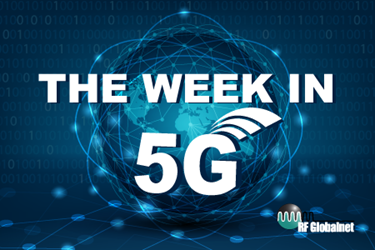The Week in 5G: 12/18/2019 — GSA Reports on 5G Network and Tech Rollouts, Verizon Claims U.S.' First 5G Shipyard
By Ed Biller

The Global mobile Suppliers Association (GSA) recently compiled a pair of reports looking at the hard numbers associated with 5G network and technology rollouts.
In terms of networks, 342 operators have invested in 5G networks, with 56 of those operators claiming commercially launched 3GPP-compliant 5G services across 31 countries, according to RCR Wireless, citing the GSA reports. In terms of technology, 199 5G devices have been announced by a total of 76 vendors, with 47 of those devices currently commercially available.
Sticking with network rollouts, Verizon announced that it has switched on 5G in parts of both Los Angeles, Calif., and Des Moines, Iowa, in the past week. The telco now has gone live with 5G in 20 of the 30 cities it pledged to cover in 2019.
Verizon also deployed last week its 5G Ultra Wideband service at Newport News Shipbuilding in Newport News, Va. In claiming the nation’s first “5G shipyard,” Verizon has claimed the site “will be equipped with enhanced network coverage, low-latency data transmission, advanced robotics, AR/VR, real-time analytics and machine learning, thereby reinforcing reliable and secured connectivity with an agile network infrastructure.”
AT&T, meanwhile, announced 5G networks going live in both San Francisco and San Jose (Calif.) late last week.
In Canada, telco TeraGo Inc. announced this week that it will “commence technical trials in the Greater Toronto Area and Greater Golden Horseshoe Area” early in 2020, utilizing fixed wireless 5G mmWave equipment from Nokia.
Further, Samsung Electronics announced this week that it will supply 4G LTE-A and 5G equipment to South Korean telco Videotron, which is rolling out networks in Quebec and Ottawa. ZDNet reports that Videotron “will supply dual-band radio stations and massive MIMO stations that support LTE connectivity” in 2020, and plans to provide 5G equipment that supports 3.5 GHz and 28 GHz spectrum at a later date.
Moving to regulation, in Germany, Chancellor Angela Merkel’s government has put off until next year its decision on security rules for Germany’s 5G network — most notable because they could cave to United States pressure to bar China’s Huawei.
Next door, in Poland, the government may impose “stricter security demands for core elements of its future 5G network than for other areas of the system,” reports Reuters. Digital Minister Marek Zagorski said Poland has sent the EU Commission its risk mitigation proposals, and that a draft bill on the security issue is likely to be presented to Poland’s parliament early in 2020.
In nearby France, the government launched this week “a procedure for assigning 5G frequency licenses after it approved specifications proposed by the communications regulator and the financial conditions for the licences,” according to a Reuters report.
The French government has fixed the price of a bloc of 50 MHz at €350 million ($386 million), and the price of an additional bloc of 10 MHz at 70 million euros. Per Reuters, French telecoms regulator Arcep added that payments for the 50 MHz blocs could be staggered over 15 years, and payments for the 10 MHz over four years.
Arcep noted previously that it will allocate 310 MHz of spectrum in the 3.4-3.8 GHz band for 5G usage. Concerns over spectrum auction price inflation drove Arcep to conduct a public consultation on its draft procedure for awarding frequency licenses between July and September of this year.
